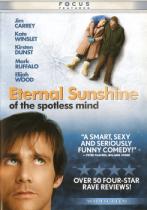Eternal Sunshine of the Spotless Mind
 Year:
Year: 2004
Film Studio: Focus Features, Anonymous Content, This Is That
Genre: Romance, Comedy, Drama
Length: 108 Min.
DirectorMichel Gondry (1963)
WritingCharlie Kaufman (1958)...Story By
Michel Gondry (1963)...Story By
Pierre Bismuth...Story By
Charlie Kaufman (1958)...Screenwriter
ProducerGeorges Bermann
Anthony Bregman
David L. Bushell
Steve Golin
Charlie Kaufman (1958)
Glenn Williamson (1963)
CinematographerEllen Kuras (1959)
MusicJon Brion (1963)...Composer
StarsJim Carrey (1962) as Joel Barish
Kate Winslet (1975) as Clementine Kruczynski
Elijah Wood (1981) as Patrick
Tom Wilkinson (1948) as Dr. Howard Mierzwiak
Kirsten Dunst (1982) as Mary
Mark Ruffalo (1967) as Stan
Thomas Jay Ryan (1962) as Frank
Jane Adams (1965) as Carrie
Review The one brilliant star that has shone brightly in the last 10 – 15 years in Hollywood has not been an actor or director, but a screenwriter. While all the major studios have been recycling the same formulaic plots to ensure a safe return on their investments, Charlie Kaufman has, with each succeeding screenplay, pushed the envelope of creative and imaginative film writing. With most films, after 20 minutes I can pretty much figure out the ending, but not with a Kaufman screenplay. His layering of subplots and the intricacies of the main theme of the story, take the viewer on a surreal journey into the realm of the uncharted frontier of the human mind.
In
Eternal Sunshine of the Spotless Mind, Kaufman poses the question; what if we could erase all memory of a love relationship that has ended by simply using computer technology. Would we be willing to erase all the pain, at the cost of losing all the good memories associated with that relationship? For some this could be an easy decision, but for me, I don’t think that I could do it. What makes our species so special is our ability to rebound from pain and to gain knowledge from the experience. And this is the point that Kaufman is making, there is no quick fix when it comes to love …we live… we learn, and we move on. Eventually the pain subsides and after awhile, you only remember the good times.
I thoroughly enjoyed watching this film and now count myself amongst the many, who look forward to the release of the next film written by this inventive genius. This was by far one of the best films of 2004, and would finally get Charlie Kaufman the Academy Award he so richly deserves. But I will tell you this…this film needs to be watched when you can give it your undivided attention. If you have screaming kids that you have to stop the film for, then it is not the time to watch this film. The intricacies and deviations in the screenplay must be absorbed by your brain without distraction, or it will come across as a confusing and convoluted mess. I have recommended this film to many people over the last few years, and each time one of them told me they didn’t like it, I asked them if they were distracted at any time during their viewing. Every person told me, that yes they were distracted by someone or something. I then told them to give it another chance, when they would definitely be alone and not at risk for interruption. And lo and behold, they then thought it was one of the best films they’ve ever seen. So, if your looking for an unconventional film that won’t leave you feeling that you've just wasted 2 hours of your life, then give this and any other film written by Charlie Kaufman a chance.
Review Criterion5 Stars - The pinnacle of film perfection and excellence.
4 ½ Stars - Not quite an immortal film, yet a masterpiece in its own right.4 Stars - Historically important film, considered a classic.
3 ½ Stars - An entertaining film that’s fun or engaging to watch.
3 Stars – A good film that’s worth a Netflix venture.
2 ½ Stars - Borderline viewable.
2 Stars – A bad film that may have a moment of interest.
1 ½ Stars – Insipid, trite and sophomoric, and that's its good points.
1 Star – A film so vacuous, it will suck 2 hours from the remainder of your life.
½ Star - A gangrenous and festering pustule in the chronicles of celluloid.